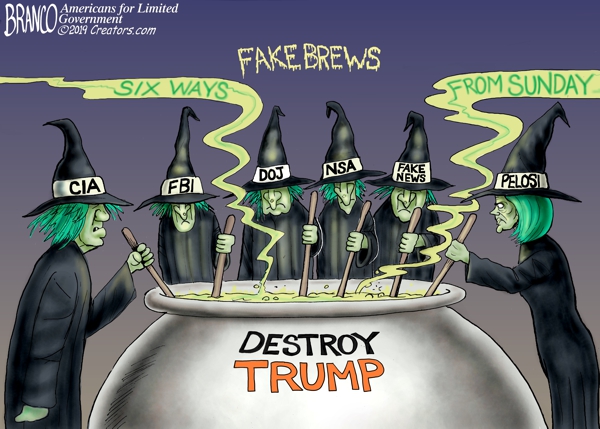House Democrats have voted to impeach President Donald Trump under the unproven premise that he leveraged $391 million of U.S. military and security assistance to Ukraine in exchange for investigations into former Vice President Joe Biden and the corrupt natural gas firm Burisma his son worked for after Biden said he had the prosecutor who says he was investigating Burisma fired.
None of the witnesses the House called to testify were able to cite President Trump either ordering or communicating to Ukraine that the military assistance was tied to such investigations, although one witness said he “presumed” that was the case when he communicated to a Ukrainian presidential aide, but that when he spoke directly with Trump he was told there was no quid pro quo.
But even if Trump had suspended the aid pending an evaluation of corruption in Ukraine or seeing if the newly elected Ukrainian President Volodymyr Zelensky would be a reliable national security partner, those are not crimes. In fact, they are all things the President has the power to do under Article II of the Constitution in the conduct of his foreign affairs powers to determine whether military assistance there is in U.S. national security interests or if Ukraine is just too corrupt to receive it.
Impeachment is supposed to be for treason, bribery or other high crimes and misdemeanors under Article II, Section 4 of the Constitution. The allegations in the Articles of Impeachment the Democrats are relying on are none of the above, and cite no criminal violations of the U.S. Code.
But why are we even sending military assistance to Ukraine and getting involved in the civil war there in the first place? And why would pausing it — again, not a crime — be of such critical importance to become House Democrats’ centerpiece on impeachment?
For all that, we should thank former British spy Christopher Steele. Steele, who was hired by the Democratic National Committee and the Hillary Clinton campaign via Fusion GPS and the law firm Perkins Coie, falsely alleged in a series of reports in 2016 that President Trump and his campaign were bought and paid for Russian agents, that then-campaign manager Paul Manafort and foreign policy advisor Carter Page had coordinated with Russia in hacking the DNC emails and putting them on Wikileaks in July 2016.
Additionally, Steele had alleged that the 2016 Republican National Convention party platform was altered at the behest of Russian President Vladimir Putin, via Carter Page, to water down a provision calling for military assistance to Ukraine.
The U.S. supported the overthrow of Ukrainian President Viktor Yanukovych in 2014, leading directly to Russia’s annexation of Crimea and eastern Ukrainian provinces that year.
But because Ukraine is a potential hotspot for the U.S. and Russia to get involved in a wider regional war, we never sent military aid through the remainder of the Obama administration.
And the U.S. would not do so until Christopher Steele alleged in 2016 that Russia wanted us not to send such assistance, and Russia had allegedly recruited Trump to run for President specifically to block the military aid, and then Trump won the election.
Only then did Congress finally approve the military assistance and the Trump administration committed to providing the aid it in 2017 and 2018. The legislative history of the military assistance itself suggests it designed specifically as a countermeasure to Russia’s supposed operation with Trump. The chief proponent for military assistance was Sen. John McCain beginning in Feb. 2017, who had personally received the Steele dossier and was a true believer in its allegations.
Fast forward to 2019. In July, Trump did have the White House Office of Management and Budget (OMB) briefly pause military assistance to Ukraine under OMB’s apportioning powers while considering requesting a potential rescission of the funds, pending reviews by the Departments of State and Defense, which were completed, and the aid was released on Sept. 11.
To the President’s opponents, the pause of military assistance raised a red flag, since it impacted directly on Steele’s initial allegations about Russia wanting to get Trump elected specifically to stop U.S. military assistance to Ukraine.
And now it has led to the wrongful impeachment of Trump.
This allegation was also used by the Justice Department in all four Foreign Intelligence Surveillance Act (FISA) applications against Page to get spying warrants on the Trump campaign, stating, “[A]ccording to [the sub-Source], Candidate #1’s [Trump’s] team, which the FBI assesses includes at least Page, agreed to sideline Russian intervention in Ukraine as a campaign issue and to raise U.S./NATO defense commitments in the Baltics and Eastern Europe to deflect attention away from Ukraine.”
But ultimately the allegation about the change to the Republican platform was widely debunked in reports from both Special Counsel Robert Mueller and Justice Department Inspector General Michael Horowitz this year.
On the change to the platform, Mueller found “the investigation did not establish that one Campaign official’s efforts to dilute a portion of the Republican Party platform on providing assistance to Ukraine were undertaken at the behest of candidate Trump or Russia.”
As for Horowitz, he found that Page had communicated the opposite to an FBI confidential human source: “With regard to the platform committee during the Republican National Convention, Page said that he “stayed clear of that-there was a lot of conspiracy theories that I was one of them … [but] totally off the record … members of our team were working on that, and … in retrospect it’s way better off that I…remained at arms length.”
And, that this exculpatory information was kept away from senior leadership at the Justice Department making decisions about the FISA warrants. Per Horowitz: “the FBI did not advise [the Office of Intelligence] that Carter Page denied having been involved with the Republican Platform Committee. Page’s statements to the FBI CHS, if true, would have been inconsistent with the FBI’s assessment in the FISA application that Page helped influence the Republican Party to change its platform to be more sympathetic to Russia’s interests by eliminating language in the Republican platform about providing weapons to Ukraine. The FBI’s assessment was based in part on Report 95’s allegation that Page and possibly others agreed to sideline Russian intervention in Ukraine as a campaign issue in exchange for Russia’s disclosure of hacked DNC emails to Wikileaks. The assessment also drew upon news articles in July and August 2016 reporting that the Trump campaign influenced the Republican Party to change its platform to not call for giving Ukraine weapons to fight Russian and rebel forces.”
Additionally, Horowitz found the information was similarly kept away from the FISA court, and did not alter the FBI’s assessment of Page: “We found that, other than this information from Report 95, the FBI’s investigation did not reveal any information to demonstrate that Carter Page had any involvement with the Republican Platform Committee. We further found that, even after the FBI identified the individuals who were involved with influencing the Republican Platform change on Ukraine (which did not include Page), the FBI never altered their assessment. The FBI also did not include in any subsequent Carter Page FISA applications information that contradicted the assertion that Carter Page was involved with the Republican Platform Committee’s provision on Ukraine, nor did OI provide such information at any time to the FISC.”
And so, the allegation that the Republican Party platform was altered at the behest of Russia was a lie. But it was a powerful lie.
As a refresher, the Steele dossier, big lie that it was, paid for by the Clinton campaign in 2016 has overall led to: 1) Justice Department and intelligence agency spying on the Trump campaign; 2) four FISA warrants against the Trump campaign and then administration allowing electronic surveillance of the campaign and administration’s phone calls, emails, text message and other documents; 3) former Attorney General Jeff Sessions’ recusal; 4) the appointment of Special Counsel Robert Mueller; 5) U.S. escalation of the civil war in Ukraine by providing military assistance; and finally, 6) President Trump being impeached when he reconsidered whether that assistance was prudent and advanced U.S. national security objectives.
So, the Steele dossier, from a discredited former British spy, has been used to investigate and prosecute political opponents, turn this country upside down for three years and to set U.S. national security objectives. Think of that. Three years is more than 1 percent of this country’s history.
In the meantime, it is unclear how important the military assistance even is to Ukraine’s defense. Not a single FGM-148 Javelin anti-tank missile has been deployed along the eastern front of Ukraine’s civil war. They have been sitting unused in a secure facility in western Ukraine away from the fighting for almost two years now. It is hardly the cornerstone of Ukrainian national security, let alone U.S. national security.
But House Democrats would have the American people believe that President Trump briefly suspending that assistance, and inquiring about Ukraine’s corruption and potential role in 2016 election interference, is a high crime, worthy of President Trump’s removal from office. You fight the wars they want, or else. It is because they still believe in a now-debunked wild-eyed conspiracy theory that the President was a Manchurian candidate. It’s mass hysteria. That is their legacy.
Robert Romano is the Vice President of Public Policy at Americans for Limited Government.







